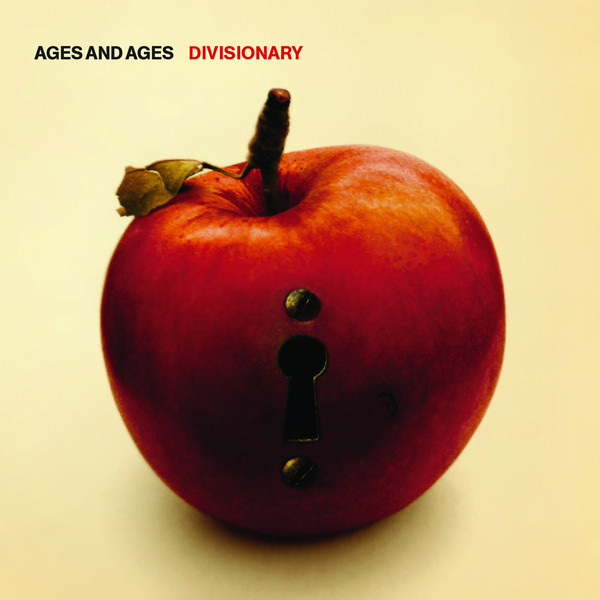"We all have our own vision of what the right path is and which key fits," says Tim Perry sitting in the living room of his NE Portland house.
He's just grabbed a copy of his new record, Divisionary, from the vinyl-filled shelf adjacent to his front door. Flipping it over, he shows me the pile of keys.
"In my mind, it's kind of overwhelming—if you're looking for the right one you might have to search for a while," the Ages and Ages' band leader and songwriter explains. "That said, there's also a lot of different locks in the world and locks represent different doors that open different paths to go down."
This new record is Ages and Ages' second but it's not just simply the next Ages' album—it's a meditated step forward in the band's story. It furthers their individual narrative and experiences as well as the ideologies that Ages' want to share with the world. It also represents the challenges that the group faced to create this record.
Musically, Divisionary once again balances Ages' ability to instill a joyful folk sound amongst underlying complexity. Dividing the sonic space between upbeat singalongs and seriousness, the lyrical half represents the latter. Acknowledging his pop sensibilities, Perry says he writes the songs he does "because they get stuck in my head," but an intimately meaningful message is an integral part of the process.
"What we experience in a group are the same things we experience within ourselves and the same things we experience with the outside world," Perry says. "Essentially, we're dealing with ourselves and the way we process things in relation to other people, whether it's our own immediate family, or strangers in the world, or political or social issues."
Internally or externally, whether in your own personal relationships or in society, "it's all the same struggle," Perry sums up. "But how do we express it? How do we deal with the things we don't like and the things we do like?"
Perry asks a lot of questions, but he doesn't necessarily expect answers. At least not immediate ones. For him, it seems answers come in the form of albums—a prolonged activity of contemplating alone and collaborating with others.
Music is "a manifestation of the processing that's going on in your mind as you're affirming and reaffirming where you're at—or even reaffirming that you don't know where you're at," Perry explains. "Certainly for me, making music is a constant revisitation of what I'm thinking and how I'm doing. I try to make it a conversation and I ask other people, 'Where are you at? What are you thinking?'"
 ‘Divisionary’ will be officially released on March 25 via Partisan Records
‘Divisionary’ will be officially released on March 25 via Partisan Records
A Vision for the World
Life "is confusing and it is a struggle," Perry says, and with Divisionary, he honestly asks listeners to consider his band's ideas about "what we should be striving towards."
"For over a decade now, I've been personally grappling with how to be a part of society while at the same time being so often disappointed," Perry says. Is it futile to participate in a society "when I'm so against where we're headed?"
"What do we do, especially in this day and age, when we're so polarized? Do we completely drop out? Do we engage? Or do we find a way to kind of do both?" Perry asks. It seems too easy to drop out. It may be hardest but the most constructive to engage, all while "not internalizing it, not letting it make us negative and hateful."
History is full of individuals "essentially making the world a better place but pissing a lot of people off in the process," Perry says. "I think, lyrically, what we've come back to a lot with these songs is the reality that this world is an extremely negative place, and the direction that we're headed is frustrating to a lot of people."
"Living counter to that is upsetting to the mainstream. Suggesting or embodying change can be offensive to some people," he explains. "I think that's what this band is trying to talk about. How to disassociate yourself from this culture of greed while at the same time keeping love in your heart. There's a difference between saying, 'I don't care,' and saying, 'I don't identify with it but I still believe in change. I still have hope and optimism. I'm going to acknowledge it, but I'm not going to allow it to consume me.'"
But what about Divisionary’s potentially most unapologetic track? "Over It" begins by repeating the titular lyrics "I'm over it, I'm over it, I'm over it," while the latter half finds the chorus chanting:
And I have, no remorse, for the way that I am anymore
No, I feel, feel no shame, if you want you can just look away
This could be "one of those more jaded-sounding songs and I like the ambiguity of that," Perry explains. "Is this 'Fuck it, I'm over it?' Or is this more of a celebratory, 'I've just cut my ties to something and I no longer feel like I need to worry about it any more?'"
As a whole, "I'm hoping that musically Divisionary ends up being a conversation—more than just a statement taken at face value but rather something to churn over in your mind, offering an opportunity to look at the complexity of life and the situation and the struggle," Perry says.
Balancing Division in the Band
 Tim Perry at Mississippi Studios: Photo by Autumn Andel
Tim Perry at Mississippi Studios: Photo by Autumn Andel
The band's life runs parallel to its Divisionary worldview.
Auditorily, Ages and Ages sounds familial—up to eight-part harmonies, choral call and responses, and catchy, poppy melodies—and the band truly seems like a family, with ups and downs and everything in between.
On an emotional level, band members experienced both happiness and despair in the years between records. Division meant some enjoyed the highs of babies being born and marriages sealed while others withstood the lows of strained relationships or the loss of friends and family members.
For Perry, revisiting his emotions and reaffirming who he is creates the balance necessary to cope with difficult situations. Making music, as well as listening to it, is cathartic. "If anybody would ever say that it isn't I would want to ask them, 'How can it not be?'"
"The only reason why you can be sad is because you know what love is. You know what loss is and you know what happiness is—you've appreciated all these things," he says. This personal, emotional experience—of love and loss—is what makes Ages' music so powerful and cathartic and passionate, all of which pours forth from Divisionary.
A much more labored follow-up to 2011's debut Alright You Restless, which was recorded over the course of eight days, this one took significantly longer, Perry says. That said, there was always a conscious effort to maintain the spontaneity of the band's performances, and they did so by recording each track live together (as they did on the first record), either at Jackpot! Recording Studios with producer Tony Lash (Elliott Smith, The Dandy Warhols) or during recording sessions at bassist and percussionist Rob Oberdorfer's house.
Having a vision can also result in division, and this included personnel changes during the recording process. "We've had such a big cast of characters" over the years, Perry says, describing the band as "a collective." With eight members sure to take the stage for hometown gigs, six are able to pack up and travel around the country (and world with their recent stint in Europe), plus Perry references an "extended family" of almost 20 people who have played a vital role in the band's life. (At present, Perry and Oberdorfer are joined by Sarah Riddle, Becca Schultz, Annie Bethancourt and Levi Cecil, as well as John McDonald and Jade Brings Plenty at times.)
 Album art by Portland artist Eric Lee
Album art by Portland artist Eric Lee
An eight-person family is a large one and choosing a key means making a decision.
"When you make a decision to follow a path, you also sometimes have to cut yourself off from a preexisting perspective," Perry says. "The choices we make sometimes lead us in different directions… [and sometimes] that creates enough conflict for change to be necessary."
Making decisions come with consequences. Quoting the album’s lead single—"Divisionary (Do The Right Thing)"—Perry says, "It's not easy to do the right thing, especially when it hurts other people or causes conflict—even within yourself, making you reinvestigate your own ideas or whatever you've been socially conditioned to see as right."
“It's easy to confuse doing the right thing with doing the wrong thing when doing the right thing means you're going to hurt somebody's feelings,” Perry says. “It feels like it must be wrong. Figuring that out is hard."
Yet, there’s still a pile of keys in front of you and a myriad of paths to choose from. Pick up a key—it may change the course of your life.
Catch Ages and Ages alongside Portland's Fanno Creek and Us Lights at Mississippi Studios on March 1 when they celebrate the release of Divisionary. And leave a comment below for your chance to win a pair of tickets!
Lead image of Ages' Tim Perry and Rob Oberdorfer by Portland photographer and director Alicia J. Rose.








